
Cue sports are a wide variety of games of skill played with a cue, which is used to strike billiard balls and thereby cause them to move around a cloth-covered table bounded by elastic bumpers known as cushions. Cue sports are also collectively referred to as billiards, though this term has more specific connotations in some varieties of English.

Eight-ball is a discipline of pool played on a billiard table with six pockets, cue sticks, and sixteen billiard balls. The object balls include seven solid-colored balls numbered 1 through 7, seven striped balls numbered 9 through 15, and the black 8 ball. After the balls are scattered with a break shot, a player is assigned either the group of solid or striped balls once they have legally pocketed a ball from that group. The object of the game is to legally pocket the 8-ball in a "called" pocket, which can only be done after all of the balls from a player's assigned group have been cleared from the table.

Snooker is a cue sport played on a rectangular billiards table covered with a green cloth called baize, with six pockets: one at each corner and one in the middle of each long side. First played by British Army officers stationed in India in the second half of the 19th century, the game is played with 22 balls, comprising a white cue ball, 15 red balls and 6 other balls—a yellow, green, brown, blue, pink and black—collectively called 'the colours'. Using a snooker cue, the individual players or teams take turns to strike the cue ball to pot other balls in a predefined sequence, accumulating points for each successful pot and for each foul committed by the opposing player or team. An individual frame of snooker is won by the player who has scored the most points, and a snooker match ends when a player wins a predetermined number of frames.

English billiards, called simply billiards in the United Kingdom and in many former British colonies, is a cue sport that combines the aspects of carom billiards and pool. Two cue balls and a red object ball are used. Each player or team uses a different cue ball. It is played on a billiards table with the same dimensions as one used for snooker and points are scored for cannons and pocketing the balls.

Russian pyramid, also known as Russian billiards, is a form of billiards played on a large billiard table with narrow pockets. It is played across Russia and several former Soviet/Eastern Bloc countries. In the West, the game is known as pyramid billiards, or simply pyramid.

Pool is a series of cue sports played on a billiard table. The table has six pockets along the rails, into which balls are shot. Of the many different pool games, the most popular include: eight-ball, blackball, nine-ball, ten-ball, seven-ball, straight pool, one-pocket, and bank pool. Eight-ball is the most frequently played discipline of pool, and it is often thought of as synonymous with "pool".
The following is a glossary of traditional English-language terms used in the three overarching cue sports disciplines: carom billiards referring to the various carom games played on a billiard table without pockets; pool, which denotes a host of games played on a table with six pockets; and snooker, played on a large pocket table, and which has a sport culture unto itself distinct from pool. There are also games such as English billiards that include aspects of multiple disciplines.

Pool Paradise is a 2004 pocket billiards video game, developed by Awesome Studios, and published by Ignition Entertainment, released for Microsoft Windows, PlayStation 2, and GameCube. The game is the fourth game to be endorsed by professional snooker and pool player Jimmy White.
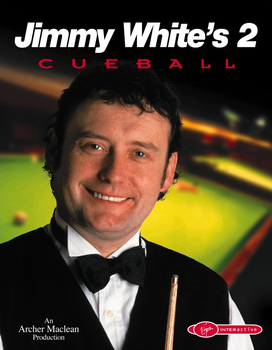
Jimmy White's 2: Cueball is a snooker and pool video game developed by Awesome Developments and published by Virgin Interactive as a sequel to Jimmy White's 'Whirlwind' Snooker. It was originally released in 1999 for Windows and Dreamcast. A PlayStation version was released in 2000 in Europe and North America, with Bay Area Multimedia handling distribution for the latter territory. Archer Maclean, the designer of the original game, led the development team. The game includes mini-games connected with a pub setting. A Game Boy Color version of the game was released in 2000. A sequel to Cueball, called Jimmy White's Cueball World, was released in Europe for the PC in 2001. The game received mixed reviews from critics, with the PC and Dreamcast versions faring better than the PlayStation port.
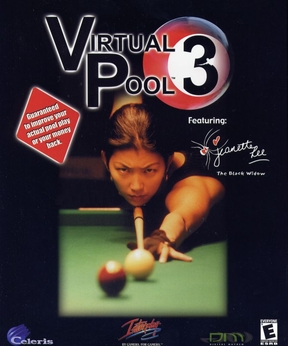
Virtual Pool 3 is a 3D, first-person sports video game that simulates various cue sports, developed and released for Windows and PlayStation by Celeris. The game features 15 pool disciplines, snooker, and two varieties of carom billiards.

Virtual Pool is a 3D, first-person sports simulation video game series with computer simulations of cue sports which was developed by Celeris. The games in the series simulate pool, snooker and carom billiards. The Virtual Pool series focuses on accurate simulation and improving the player's ability to play the sport in real life. Virtual Pool releases are sold with a money back guarantee to improve a player's external game.

Midnight Pool is a sports simulation video game by Gameloft Montreal. The pool simulator was originally released for mobile phones. Versions with enhanced graphics were later released for Windows, WiiWare, and iOS and under the name Midnight Pool 3D for phones and the N-Gage platform. It is part of Gameloft's Midnight series, which includes Midnight Bowling, Midnight Casino and Midnight Hold'em Poker.

Actua Pool also known as Ultimate 8-Ball is a sports simulation video game developed by British companies Gremlin Interactive and Mirage Ltd as part of their highly successful Actua Sports series of sport simulators of the mid-to-late 1990s. Actua Pool, a pool game, was originally released on the Microsoft Windows platform and the Sony PlayStation home console in 1999; these versions were also published under the name Pool Shark. The game was very well received, praised for its realistic physics engine and challenging AI opponents, although the game spawned a sequel which was not as successful. In 2007, Actua Pool was ported to the Nintendo DS handheld game console.
Carom billiards and pool are two types of cue sports or billiards-family games, which as a general class are played with a stick called a cue which is used to strike billiard balls, moving them around a cloth-covered billiard table bounded by rubber cushions attached to the confining rails of the table.
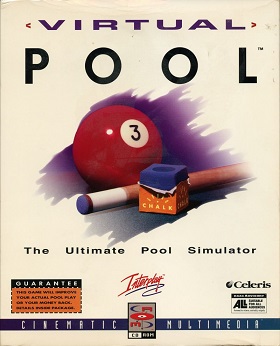
Virtual Pool is a 3D, first-person sports simulation video game released by Interplay Productions in 1995. It is the first of the Virtual Pool franchise of computer simulations of pool games developed by Celeris.
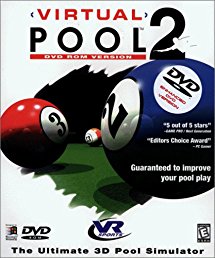
Virtual Pool 2 is a 3D, first-person sports simulation video game developed by Celeris and released by VR Sports on behalf of Interplay Productions in 1997. It is the third release of the Virtual Pool franchise of computer simulations of pool games developed by Celeris. VP2 is the second main series title in the Virtual Pool series, and would later be released alongside Virtual Pool 1.
The World Snooker Championship (WSC) is a series of video games based on snooker featuring licensing from the World Professional Billiards and Snooker Association. The first game in the series was released in 2001 and the last in 2011; a new licensed World Snooker game, Snooker 19, was released in 2019. The first four games were published by Codemasters and developed by Blade Interactive Software. Later games were published by Sega, Deep Silver and Koch Media.
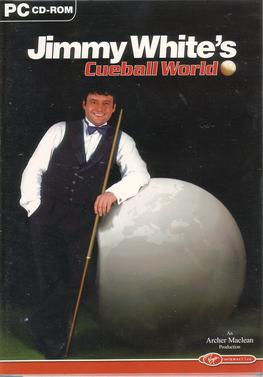
Jimmy White's Cueball World is a sports simulation video game published by Virgin Interactive as the sequel to Jimmy White's 2: Cueball, itself a sequel to Jimmy White's 'Whirlwind' Snooker. The development team once again being led by Archer Maclean, who designed the other two Jimmy White titles. The game was released in December 2001 in Europe, with a North American release was planned to be released a year later by Titus Software under a budget range using the Virgin Interactive brand name. PlayStation 2 and Xbox versions were planned, but were later cancelled.

Virtual Pool Hall is a sports simulation video game developed Celeris and published by Interplay Entertainment as an entry in the Virtual Pool franchise, an improvement and sequel to Virtual Pool 2 and PC sequel to Virtual Pool 64. The game was initially released on PC in December 1999. Pool Hall is the first game in the Virtual Pool series to have playable Snooker in addition to the regular pool gamemodes.

Virtual Pool: Tournament Edition is a sports simulation video game developed by Celeris and published by Global Star Software as an entry in the Virtual Pool franchise, a spin-off sequel to Virtual Pool 3. The game was initially released on Xbox with a planned PlayStation 2 version which was later cancelled.




















